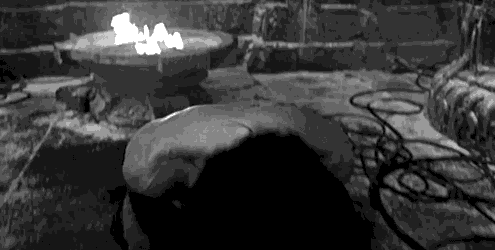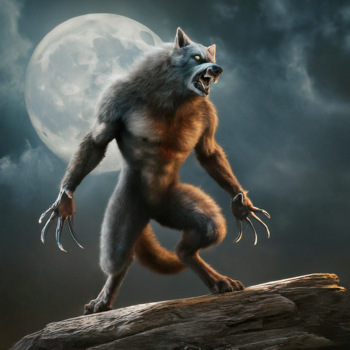Werewolf – Lycanthropy
Lycanthropy comes from the Greek lykoi, “wolf” and anthropos, “man”

The legend of the werewolf is one of the most ancient and widespread. Stories of werewolves can be found as far back as history has been written. These shapeshifter myths are worldwide from China to Iceland and Brazil to Haiti.
This humanoid creature of myth and folklore had the incredible ability to shapeshift. In numerous accounts, they are said to shift into the form of a wolf or a human-wolf-hybrid. Some legends have them being able to shift at will and others after being cursed, scratched, or bitten.
Earliest Written Account of Werewolves
Some of the first accounts of werewolves come from Ancient Greek literature.
Ovid, in the Metamorphoses, tells the tale of Lycaeon, an Arcadian King. Visited by Zeus, Lycaeon doubted the god’s omniscience. In a twisted test, he served Zeus a banquet dish containing human flesh – the flesh of his son Nyctimus. This act of horrific cruelty sealed his fate. (While some accounts mention Lycaeon having many sons, most depict him with a smaller number, typically around seven or eight.)
Unsurprisingly, this was not a very smart move… Murder and cannibalism were a major slight indeed. Upon discovering the tainted dish, Zeus changed King Lycaeon into a werewolf. Zeus felt that since Lycaeon had a penchant for human flesh, the wolf form would be a more acceptable form to take part in such a vile activity. Zeus then brought his son Nyctimus back to life.
Nyctimus succeeds his father as King of Arcadia. His rule was cut short by the floods in the age of Deucalion, which some speculate was caused by his brothers and their lack of respect for the Gods.

Well-known/Celebrity Werewolves
While “Little Red Riding Hood” features a cunning wolf, it’s not directly related to werewolf legends. Werewolf stories typically involve a human who transforms into a beast, often due to a curse or bite.
True werewolf lore has a long history, with tales of these creatures serving as warnings throughout Europe. These myths often focused on protecting the vulnerable, like children, from dangers lurking at night.
Here’s a breakdown of famous werewolves across history and entertainment
History (Real or Believed)
- Peter Stubbe (16th-Century Germany): Also known as the “Werewolf of Bedburg,” this German farmer was accused of being a serial killer who transformed into a wolf.
- The Werewolves of Ossory (Medieval Europe): Described by Gerald of Wales in his writings, these werewolves supposedly terrorized Ireland, showcasing the widespread belief in lycanthropy during that era.
Literature & Mythology
- Lycaon (Greek Mythology): An Arcadian king punished by Zeus to become the first werewolf for serving human flesh at a banquet.
- The Beast of Gevaudan (18th-century French Folklore): A real-life mystery, this ferocious beast terrorized a region of France. Though likely a large predator, some believe it was a werewolf due to its strength and ferocity.
- The Werewolf of Bedburg (Peter Stubbe): This 16th-century figure from Germany is a real-life case (though likely embellished) of a man accused of being a serial killer werewolf.
Movies & Television
- Lawrence Talbot (The Wolf Man): A classic horror character from the 1941 film “The Wolf Man” and subsequent movies. Lawrence struggles with his curse and the monstrous urges that come with it.
- David Naughton (An American Werewolf in London): This comedic horror film from 1981 offers a more lighthearted take on werewolves.
- Scott McCall (Teen Wolf): A popular character from the MTV show “Teen Wolf,” Scott navigates his teenage life while dealing with his newfound werewolf abilities.
- Remus Lupin (Harry Potter): A beloved character from the Harry Potter books and films, Professor Lupin is a werewolf who struggles with his condition but remains a loyal friend and mentor.
These are just a few examples, and there are many other werewolves in folklore, literature, and pop culture.





